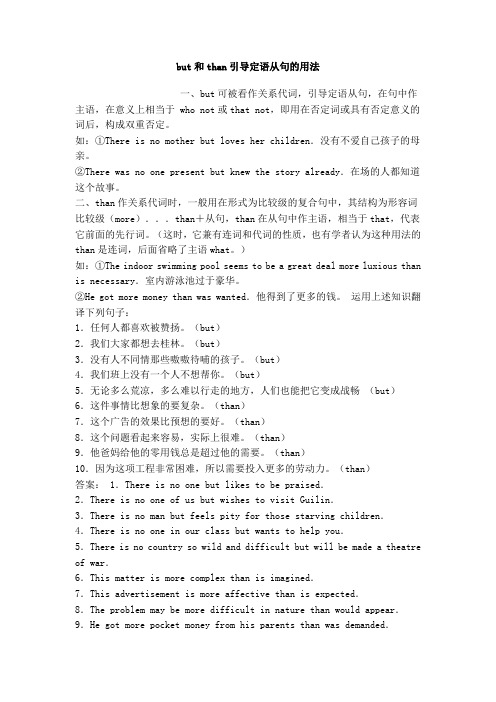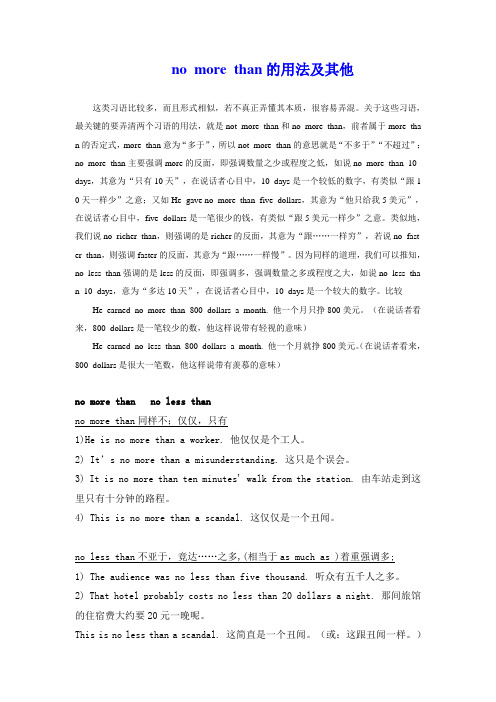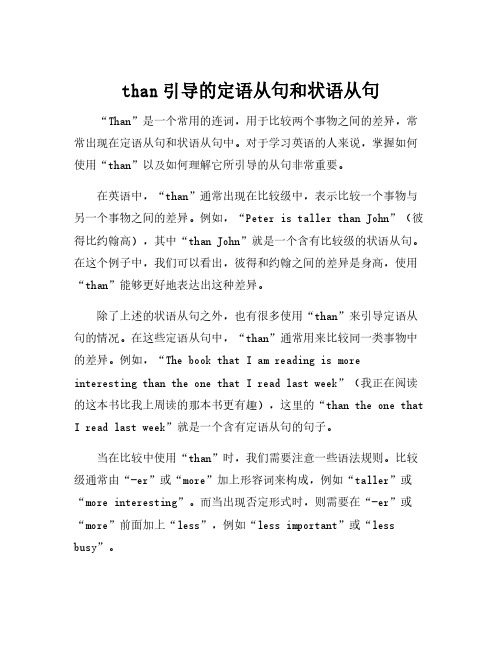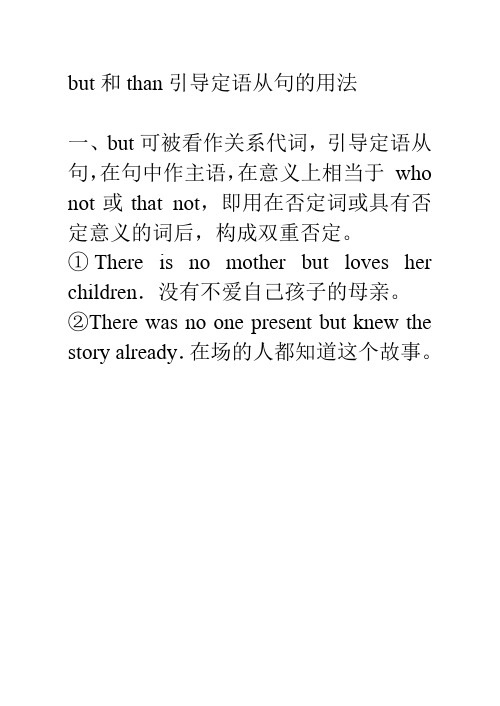than引导的定语从句
定语从句

3、由than引导的定语从句 在带有比较级的句子中,than可以 作代词,兼有连词和代词的性质。 在这样的定语从句也可以理解成 than 是连词,后面省略了主语what
The old man has eaten more food than is good for his health.
4、由but引导的定语从句 but作为关系代词主要与具有否定意 义的主句连用,且只用于限定性定 语从句。But可以指代人,也可指代 物,but的意思是who… not, that (which)…not. Not a day went by but brought us new changes.
定语从句(关系分句)
定义:关系分句(Relative Clause) 是由关系词引导的分句结 构。这种分句 结构又称“定语从 句”(Attributive Clause), 因为 这种分句的主要功能是作名词修饰 语(即“定语”)。但是,关系分 句除作“定语”外,还可表示其他 意义,因此将这种结构特征名之为 “关系分句”。
1在限制性关系分句中关系代词 的选择
a) 在分句中作主语的关系代词的选择,一般规则 who/that指人,which/that指物。
He is the man who lives next door to us.
b )关系代词作介词补足成分,介词通常前置, whom指人,which指物。
James is a man for whom I have the greatest respect.
c)当先行项被形容词最高级 ,序数词以及 first、last、few、no、very 等词修饰时。
He is the cleverest man that ever taught in our school.
but,than引导定语从句和before,until用法辨析

but和than引导定语从句的用法一、but可被看作关系代词,引导定语从句,在句中作主语,在意义上相当于 who not或that not,即用在否定词或具有否定意义的词后,构成双重否定。
如:①There is no mother but loves her children.没有不爱自己孩子的母亲。
②There was no one present but knew the story already.在场的人都知道这个故事。
二、than作关系代词时,一般用在形式为比较级的复合句中,其结构为形容词比较级(more)...than+从句,than在从句中作主语,相当于that,代表它前面的先行词。
(这时,它兼有连词和代词的性质,也有学者认为这种用法的than是连词,后面省略了主语what。
)如:①The indoor swimming pool seems to be a great deal more luxious than is necessary.室内游泳池过于豪华。
②He got more money than was wanted.他得到了更多的钱。
运用上述知识翻译下列句子:1.任何人都喜欢被赞扬。
(but)2.我们大家都想去桂林。
(but)3.没有人不同情那些嗷嗷待哺的孩子。
(but)4.我们班上没有一个人不想帮你。
(but)5.无论多么荒凉,多么难以行走的地方,人们也能把它变成战畅(but)6.这件事情比想象的要复杂。
(than)7.这个广告的效果比预想的要好。
(than)8.这个问题看起来容易,实际上很难。
(than)9.他爸妈给他的零用钱总是超过他的需要。
(than)10.因为这项工程非常困难,所以需要投入更多的劳动力。
(than)答案: 1.There is no one but likes to be praised.2.There is no one of us but wishes to visit Guilin.3.There is no man but feels pity for those starving children.4.There is no one in our class but wants to help you.5.There is no country so wild and difficult but will be made a theatre of war.6.This matter is more complex than is imagined.7.This advertisement is more affective than is expected.8.The problem may be more difficult in nature than would appear.9.He got more pocket money from his parents than was demanded.10.The project requires more labor than has been put in because it is extremely difficult.before 与until在日常的英语学习中,我们遇到before和until时,往往会将二者搞错。
定语从句句式

定语从句句式定语从句定义:在复合句中修饰名词或代词的从句;被修饰的名词或代词叫先行词。
种类:关系代词:who、whom、whose、which、that关系副词:where、when、why准关系代词:as、but、than复合关系代词:what、whatever、whoever、whichever一、关系代词引导的定语从句(1)由who引导的定语从句:1.关系代词who用作主语,指人或动物;2.who;不能用作表语;(2)由who引导的定语从句:1.关系代词whom用作宾语,指人;2.whom不能用作表语;(3)由whose引导的定语从句:1.关系代词whose作定语,既可指人也可指物。
2.whose用于引导定语从句时,有“whose=of which”(4)由which引导的定语从句:1.关系代词做主语、谓语动词或介词的宾语,指物或动物;2.常用关系代词which作表语,既可指人也可指物,“人”要具有某种特性;3.which既能引导限制性定语从句,也能引导非限定性定语从句;(5)由of which/whom引导的定语从句:1.名词、不定代词、数量词+of which/whom2. of which/whom从句中作主语有两种形式:数词、名词+of which/whom 或of which/whom+数词、名词3.“名词+of which”做主语时常用“whose+名词”取代;4.of which所修饰的名词前应加上定冠词;(6)由介词+which+抽象名词引导的定语从句:1.在非限制性定语从句中,以“介词+which+抽象名词”结构补充说明,which作定语;2.the way后接定语有三种形式:不加;加that;加in which;(7)由that引导的定语从句:1.关系代词that在从句中作主语或宾语,不作介词宾语,既指人也指物;2.先行词是不定代词时,必须用that引导定语从句;3.先行词被不定代词修饰时,必须用that引导定语从句;4.先行词被序数词或形容词最高级修饰时,必须用that引导定语从句;5. 先行词既有人又有物时,必须用that引导定语从句;6. 先行词被the only、the same、the last修饰时,必须用that 引导定语从句;7.以who、which引起的问句中,为避免重复,常用that引导定语从句;8.用作关系副词以修饰表示时间的名词时,常用that代替when 引导定语从句;9.构成非限制性定语从句时,不用that;10关系代词前有介词且指物时,不用that;11.先行词本身是that时,不用that;12.关系代词之后有插入成分时,不用that;二、关系副词引导的定语从句(1)由when的定语从句:1.关系副词when是兼有连词作用的副词,常用于表示时间;2.先行词为表示时间的名词;3在口语中,先行词为表示时间的名词时,可以省略when;4先行词在从句中起副词作用作时间状语时,用when引导定语从句;先行词在从句中起代词作用作宾语时,用which/that引导定语从5.在this/that/it’s后可省略先行词the time;6.现代英语口语中,the day when、the time when、the moment when可用that代替;;7.关系副词when可用恰当的“介词+which”代替;(2)由where引导的定语从句:1. 关系副词where是兼有连词作用的副词,常用于表示地点;2.先行词为表地点或有地点含义的抽象名词;3.在口语中,先行词是place、room等词时,可以省略where;4.先行词在从句中起副词作用作地点状语时,用where引导定语从句;先行词在从句中起代词作用作宾语时,用that/which引导定语从句;5. 在this/that/it’s后可省略先行词the place;6. 现代英语口语中,the place where可用the place that代替;7. 关系副词where可用恰当的“介词+which”代替;(3)由why引导的定语从句:1. 关系副词why兼有连词作用的副词,常用于表示原因;2.先行词只有reason;3.在口语中,可以省略why;4.先行词reason在从句中起副词作用表原因时,用why引导定语从句;先行词reason在从句中起代词作用作宾语时,用that/which引导定语从句;5.在this/that/it’s后可省略先行词the reason;6.现代英语口语中,the reason why可用the reason that代替;7. 关系副词why可用恰当的“介词+which”代替;(4)由介词+where/when引导的定语从句:1.from where引导的定语从句中,where代表主句提供的地点;2.since/by when引导的定语从句中,when代表主句提供的时间三、准关系代词引导的定语从句(1)由准关系代词as引导的限制性定语从句:1.as既可作引导状语从句的连词,也可作引导定语从句的关系代词;2.在such…as引导的定语从句中,as在从句中作主语或表语;3.在the same…as引导的定语从句中,as在从句中作主语或宾语;4.在as…as引导的定语从句中,as在从句中作主语;5.区别:such…as引导定语从句,such…that引导结果状语从句;6.区别:the same…as指两物相似,the same…that描述的是同一物;(2)由准关系代词as引导的非限制性定语从句:1.as代表主句或主句一部分的意思,不能指代某个名词或代词;2.在as引导的非限制性定语从句中,as可以放在主句的任意位置,在从句中作主语或宾语;3.主句表否定,as引导的定语从句位于主句之后时,as指代的主句不表否定,可用but代替;4.主句表否定,as引导的定语从句位于主句之前时,as指代的主句仍表否定意义;5非限制性定语从句中,which引导的从句不能放在主句前,as 引导的从句可放在主句前后.;6.非限制性定语从句中,as/which用作关系代词时都可指代一个句子,但as有“就像”之意;7.非限制性定语从句中,当从句的谓语动词时be动词或连系动词时,as/which都可作主语;8.非限制性定语从句中,当从句的谓语动词是行为动词时,只能用which作主语;9.非限制性定语从句中,as可作连词引导状语从句,构成“as+过去分词”形式,表定语义;(3)由准关系代词but引导的定语从句:1.but本身含有否定义,相当于who/which/that…not;2.but的先行词往往是有否定义的代词或名词词组,通过双重否定表强烈肯定;3.but用于定语从句中作主语,此时谓语动词的数要与先行词一致,时态要与主句一致;4.but用于引导状语从句时,有“but=that...not”(4)由准关系代词than引导的定语从句:1.than引导的定语从句中,谓语动词的数和时态必须与被比较级修饰的先行词一致;2.than引导的状语从句中,用作连词的than可兼作关系代词在主句中作主语,than指代主句;3.than引导的状语从句中,构成“than+过去分词”结构,than 后省略了形式主语it、动词be;四、复合关系代词引导的定语从句(1)复合关系代词what引导的定语从句:1.定语从句中,what是由先行词和关系代词组成的复合词,是兼作先行词的关系代词;2.what用于指人时,what=the person that;what用于指物时,what=the thing(s) which;3.what在定语从句中起名词作用时,可作主语、宾语、表语;4.what在定语从句中起形容词作用时,修饰名词,意为“仅有的”;5.what在定语从句中起形容词作用时,常与few、little连用,意为“尽管不多,但已全部”;6.what引导的名词性从句中,无疑问义,可作从句的主语、宾语、介宾、宾补;7.what用于表比喻义的特殊结构:A is to B what C is to D;8.what组成的常用短语:What if…? 如果…怎么样?What of it?那又怎么样?(2)复合关系代词whoever,whomever,whichever,whatever引导的定语从句:1.whoever、whomever、whichever、whatever具有名词功能,引导名词性从句;2.whoever、whomever、whichever、whatever指代未知的人或物,在从句中作主语或宾语;3.whichever、whatever在名词性从句中兼起形容词作用,修饰从句中名词,意为“仅有的”;4. whoever、whichever、whatever在名词性从句中兼起副词作用,引导让步状语从句;五、关系代词的省略1.当关系代词在定语从句中作宾语时往往省略;2.当关系代词在定语从句中作表语时,用that且往往省略;3.当先行词为不定代词时,往往不用关系代词;4.当定语从句为there be句型时,往往不用关系代词;5.当主句为there be句型时,实际主语后若带有定语从句,作主语的关系代词有时省略;六、插入语(1)分句用作插入语:I believe、I find、I hear、I imagine、I remember、I think、I sup pose…(2)状语分句作插入语:1.可作插入语的状语分句有:as far as I know、as I told you before、if you like…2.省略形式的状语分句作插入语:if ever、if possible、if any…(3)what构成的惯用插入语:1.“what+be+比较级形容词”结构,意为“而且,尤有甚者“;2.“what we call,what is called”,意为“所谓的”;3.“what+…”的类似结构:what we consider、what you refer to as、what is referred to as…例句:This is the man who helped me.(who在从句中作主语)The doctor whom you are looking for is in the room.(whom 在从句中作宾语)Do you see the house whose windows are all broken?(whose在从句中作定语)The building which stands near the river is our school.(which在从句中作主语)This is the book (which) you want.(which在从句中作谓语动词的宾语)The room in which there is a machine is a workshop.(which 在从句中作介宾)The war killed 1000 people, most of which were very young.(“不定代词+of which”的形式)The committee consists of 20 members, five of whom are women.(“数量词+of whom”的形式)Do you see the house the windows of which are all broken?(“名词+of which”作主语结构之一)Do you see the house of which the windows are all broken? (“名词+of which”作主语结构之二)It rained all night, during which time the ship broke in pieces.(“介词+which+抽象名词”结构)That’s the way (/) he spoke.(the way后接定语的形式之一)That’s the way that he did it. (the way后接定语的形式之二) That’s the way in which you answered the question. (the way后接定语的形式之三)。
no more than的用法及其他

no more than的用法及其他这类习语比较多,而且形式相似,若不真正弄懂其本质,很容易弄混。
关于这些习语,最关键的要弄清两个习语的用法,就是not more than和no more than,前者属于more tha n的否定式,more than意为“多于”,所以not more than的意思就是“不多于”“不超过”;no more than主要强调more的反面,即强调数量之少或程度之低,如说no more than 10 days,其意为“只有10天”,在说话者心目中,10 days是一个较低的数字,有类似“跟1 0天一样少”之意;又如He gave no more than five dollars,其意为“他只给我5美元”,在说话者心目中,five dollars是一笔很少的钱,有类似“跟5美元一样少”之意。
类似地,我们说no richer than,则强调的是richer的反面,其意为“跟……一样穷”,若说no fast er than,则强调faster的反面,其意为“跟……一样慢”。
因为同样的道理,我们可以推知,no less than强调的是less的反面,即强调多,强调数量之多或程度之大,如说no less tha n 10 days,意为“多达10天”,在说话者心目中,10 days是一个较大的数字。
比较He earned no more than 800 dollars a month. 他一个月只挣800美元。
(在说话者看来,800 dollars是一笔较少的数,他这样说带有轻视的意味)He earned no less than 800 dollars a month. 他一个月就挣800美元。
(在说话者看来,800 dollars是很大一笔数,他这样说带有羡慕的意味)no more than no less thanno more than同样不;仅仅,只有1)He is no more than a worker. 他仅仅是个工人。
than引导的定语从句和状语从句

than引导的定语从句和状语从句“Than”是一个常用的连词,用于比较两个事物之间的差异,常常出现在定语从句和状语从句中。
对于学习英语的人来说,掌握如何使用“than”以及如何理解它所引导的从句非常重要。
在英语中,“than”通常出现在比较级中,表示比较一个事物与另一个事物之间的差异。
例如,“Peter is taller than John”(彼得比约翰高),其中“than John”就是一个含有比较级的状语从句。
在这个例子中,我们可以看出,彼得和约翰之间的差异是身高,使用“than”能够更好地表达出这种差异。
除了上述的状语从句之外,也有很多使用“than”来引导定语从句的情况。
在这些定语从句中,“than”通常用来比较同一类事物中的差异。
例如,“The book that I am reading is moreinteresting than the one that I read last week”(我正在阅读的这本书比我上周读的那本书更有趣),这里的“than the one that I read last week”就是一个含有定语从句的句子。
当在比较中使用“than”时,我们需要注意一些语法规则。
比较级通常由“-er”或“more”加上形容词来构成,例如“taller”或“more interesting”。
而当出现否定形式时,则需要在“-er”或“more”前面加上“less”,例如“less important”或“less busy”。
此外,我们还需要注意“than”所引导的从句中应该使用正确的主谓一致形式。
例如,“The athletes run faster than the spectators”(这些运动员跑得比观众快),这里的“run”是运动员的动词,而不是观众的动词。
总之,掌握“than”引导的定语从句和状语从句非常重要,可以帮助我们更好地表达比较和差异。
同时,需要注意语法规则和主谓一致形式,以避免语法错误。
but和than 定语从句

but和than引导定语从句的用法一、but可被看作关系代词,引导定语从句,在句中作主语,在意义上相当于who not或that not,即用在否定词或具有否定意义的词后,构成双重否定。
①There is no mother but loves her children.没有不爱自己孩子的母亲。
②There was no one present but knew the story already.在场的人都知道这个故事。
二、than作关系代词时,一般用在形式为比较级的复合句中,其结构为形容词比较级(more)...than+从句,than在从句中作主语,相当于that,代表它前面的先行词。
这时,它兼有连词和代词的性质①The indoor swimming pool seems to bea great deal more luxurious than is necessary.室内游泳池过于豪华。
②He got more money than was wanted.他得到了更多的钱。
运用上述知识翻译下列句子:1.任何人都喜欢被赞扬。
(but)2.我们大家都想去桂林。
(but)3.没有人不同情那些贫困的孩子。
(but)4.我们班上没有一个人不想帮你。
(but)5.这件事情比想象的要复杂。
(than)6.这个广告的效果比预想的要好。
(than)7.这个问题看起来容易,实际上很难。
(than)8.他爸妈给他的零用钱总是超过他的需要。
(than)答案:1.There is no one but likes to be praised.2.There is no one of us but wishes to visit Guilin.3.There is no man but feels pity for those poor children.4.There is no one in our class but wants to help you.5.This matter is more complex/ complicated than is imagined.6.This advertisement is more affective than is expected.7.The problem may be more difficult in nature than would appear.8.He got more pocket money from his parents than was demanded.5.无论多么荒凉,多么难以行走的地方,人们也能把它变成战场?(but)5.There is no country so wild and difficult but will be made a theatre of war.。
英语单项选择题
A NoneB BothC NeitherD All您所选答案:A had been pointingB have been pointingC were pointingD pointed您所选答案:A by whichB thatC in whereD where您所选答案:A whichB whatC thatD they您所选答案:A beingB to beC to have beenD having been您所选答案:A how little moneyB so little moneyC such little moneyD what little money 您所选答案:A whoB asC thatD like您所选答案:A have bben put inB being put inC has been put inD to be put in您所选答案:A Had it not beenB Hadn't it beenC Was it notD Were it not 您所选答案:A I'd decideB I decidedC I decideD I'm deciding 您所选答案:A awardB compensationC prizeD reward您所选答案:A onlyB quiteC narrowlyD seldom您所选答案:A unjustifiedB unjustC misguidedD unaccepted 您所选答案:A promisingB agreeingC pleasingD obliging您所选答案:A applicationB bidC proposalD suggestion 您所选答案:A indicativeB positiveC revealingD evident您所选答案:A regretfulB regrettableC regrettingD regretted 您所选答案:正确答案: B答案详解:译文:令人遗憾的是,工会和管理层之间缺乏沟通。
but和than引导的定语从句
but和than引导的定语从句由于长期模式化的学习,很多学习者对于定语从句的引导词就有了一种定势的理解,所以无法理解but和than可以充当定语从句中的关系词。
作为特殊的关系代词,but和than 在定语从句中也是充当主语或宾语。
But引导的定语从句相当于一个否定的结构who/which/that...not,表示某某人或事物不....;than引导的定语从句必须出现在比较级中,同时意义上保留“比”的意思。
but引导的定语从句前文已经说过but引导定语从句时的功能及其含义,以下有两个例句,在翻译时一定要注意将but翻译成who/that/which...not例1:Don’t be confined by rules. There is no rules but have exceptions.不要让规则限制了你,没有规则没有例外。
注释:此时but在从句中充当主语,从句相当于there is no rules which/that do not have exceptions。
例2:There is no man but admires her generosity and kind heart.没有人不赞赏她的慷慨和好心。
注释:此时but在从句中充当主语,相当于there is no man who does not admire her generosity and kind heart。
than 引导的定语从句than引导定语从句一定出现在比较级当中,所以在理解上也要将than的意义放进去。
例1:Children today are likely to have less supervision at home than was common in the traditional family structure. (此时than在句中充当主语)与传统家庭结构相比,现代家庭结构中的孩子受到的管教表少了。
定语从句特殊用法
定语从句中的特殊用法定语从句是起定语作用的,修饰,说明名词,代词或句子内容的从句,被定语从句修饰的词叫做先行词。
引导定语从句,并在句中担任成分的词叫做关系代词或关系副词。
定语从句是高考常考内容之一,使用时要尤其注意以下十种特殊用法。
一、只用that不用which的情况1、当先行词是all, little, few, much, something, everything, anything, nothing, none等不定代词时。
如:Everything that happened then was like a nightmare.当时发生的一切就像是一场噩梦。
I will tell him all that you told me at the ball.我要把你在舞会上跟我说的话全都告诉他。
2、当先行词被only, any, few, little, no, all, just, very(恰好的,表示强调)等词修饰时。
例如:The only thing that we could do was to wait.我们能做的只是等待。
That’s the very thing that we can do.那正是我们能做的事。
3、当先行词是序数词、形容词最高级或先行词被序数词或形容词最高级修饰时。
例如:The first place that we visited was the Great Wall.我们参观的第一个地方是长城。
This is the best novel that I have ever read.这是我看过的最好的小说。
4、被修饰词为数词时。
例如:Yesterday I caught two fish and put them in a basin of water. Now you can see the two that are still alive. 昨天我捉到了两条鱼,把它们放在一盆水里。
Than 的难点用法解析
五、引导比较状语从句且在从句中充当成分 有时可引导一个从句并在从句中充当句子成 分(主语、宾语、表语),为便于理解,有时 可视为than后省略了what (但实际上这个 what通常不宜补上,除非在英国某些方言 里),但也有人认为在一些类似情况下than有 点像关系代词,引导一个类似于定语从句的 句子(但又不完全像定语从句,因为有时其前 没有先行词),这类省略句通常不能补上所缺 的主语或宾语(,这类省略句通常不能补上所 缺因为than就充当了主语和宾语)。
(2) “not +比较级+than”的意思是“不 比……更”“不如”。如: He is not richer than you. 他不如你富有。 This one is not better than that one. 这 个不如那个好。
二、后接动词用不定式还是-ing分词 1. 当连接两个非谓语动词时,通常应使用 一样的形式。如: It is much easier to get into debt than to get out of it. 借债容易还债难。 He likes playing chess more than watching TV. 与看电视相比,他更喜欢下 棋。
七、同质比较还是异质比较 than 通常用于两个不同的人或物在同一方面 进行比较,但有时指的可能是同一个人或物在 两个不同的方面进行比较,此时只用于 more…than…结构,而不能用 –er…than… 的形式(即使是单音节也是如此),这类结构通 常可译为“与其……不如……”“有…… 无……”。 He’s more fat than short. 与其说他矮不如说 他胖。 They are more brave than wise. 他们有勇 无谋。
- 1、下载文档前请自行甄别文档内容的完整性,平台不提供额外的编辑、内容补充、找答案等附加服务。
- 2、"仅部分预览"的文档,不可在线预览部分如存在完整性等问题,可反馈申请退款(可完整预览的文档不适用该条件!)。
- 3、如文档侵犯您的权益,请联系客服反馈,我们会尽快为您处理(人工客服工作时间:9:00-18:30)。
• 越来越多的家庭是单亲家庭,或者父母双 方都工作。因此,这些家庭里的孩子们相 比于传统家庭结构中的孩子们得到的监管 就会少。
• 别点太多的食物,吃不完的。
• Don’t order more food than can be finished by us. • 别喝太多的酒。不好。
• Don’t drink more wine that is good for you. • 别买太多的衣服,没必要。 • Don’t buy more clothing than is necessary.
than 引导定语 从句
• 1.这件事情比想象的要复杂。(than) • This matter is more complex than was thought. • 2.结果比预想的要好。(than)
• The result is better than was expected.
.
ቤተ መጻሕፍቲ ባይዱ
• 3.他爸妈给他的零用钱总是超过他的需要。 (than)
• More families consist of one parent or two working parents; consequently, children are likely to have less supervision (监管)at home ____ was common in the traditional family structure . • A.than B.that C.which D.as
• His parents gave him more pocket money than was demanded by him.
• 4. 这项工程需要投入比现有的更多的劳 动力(than) • The project requires more labor than has been present
